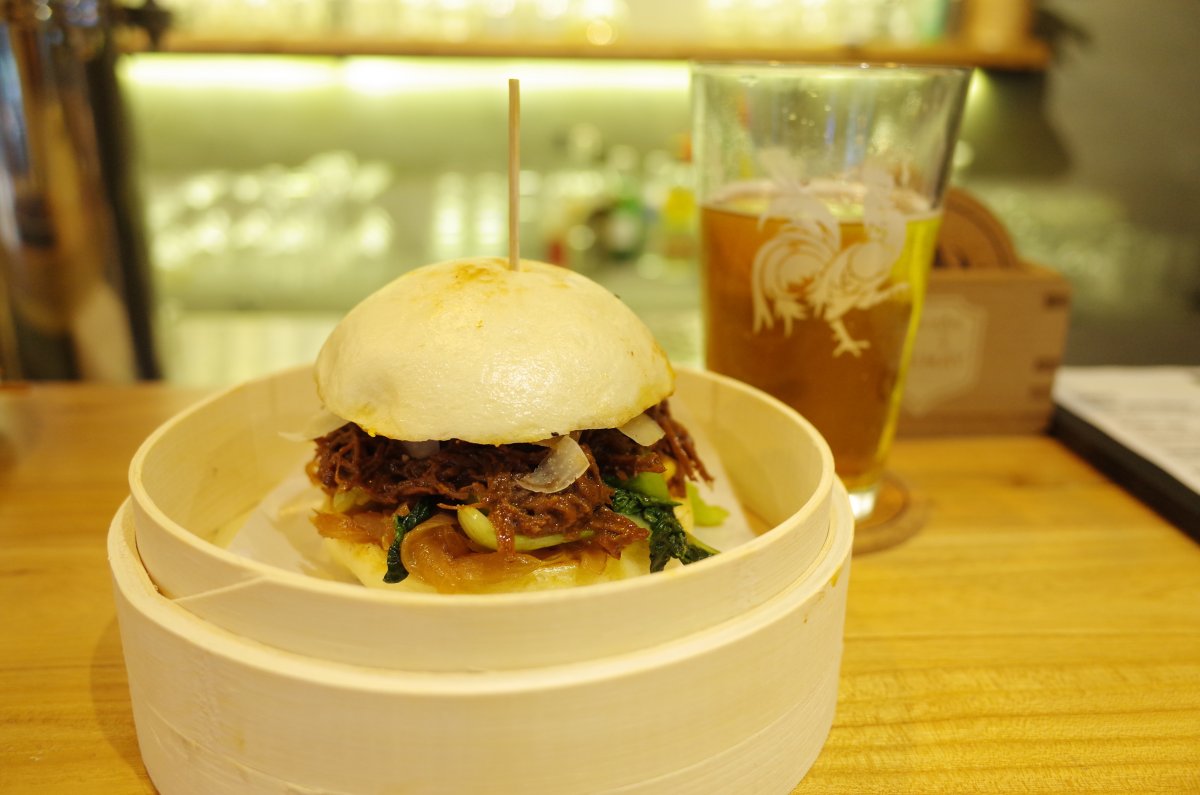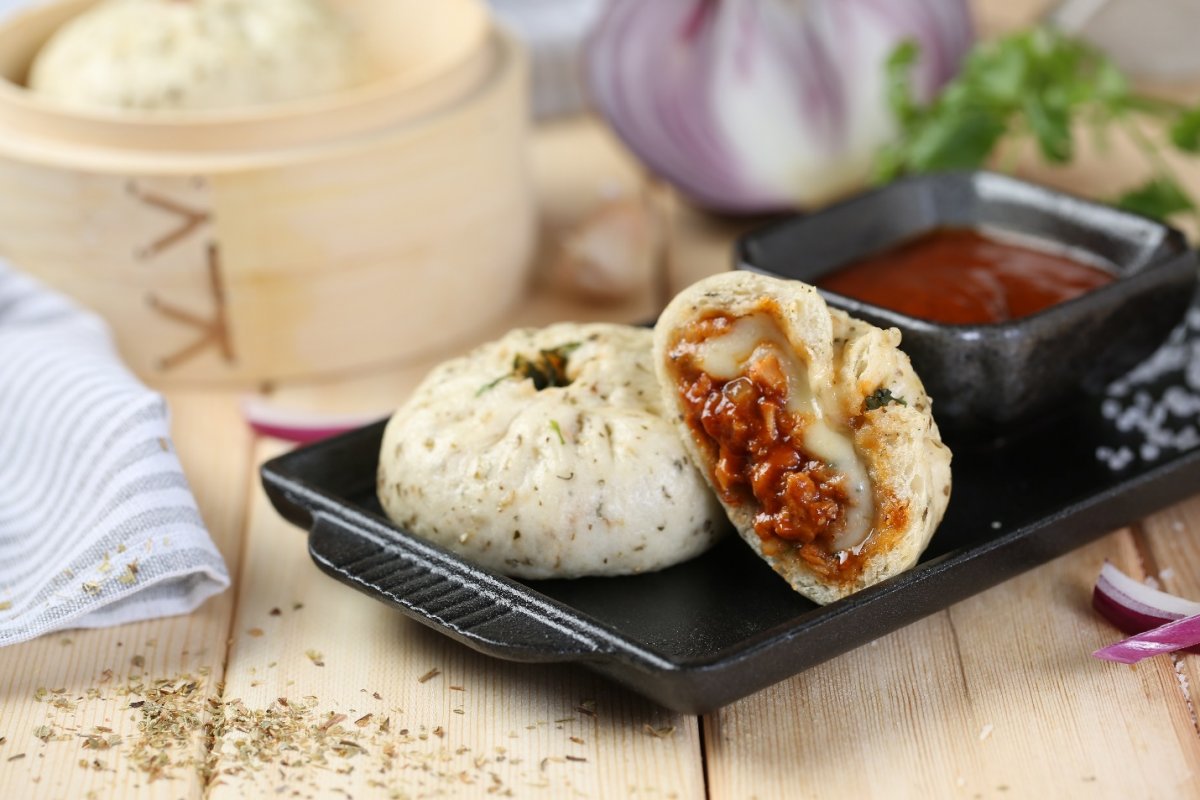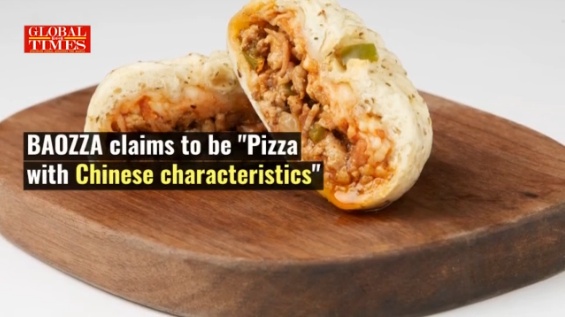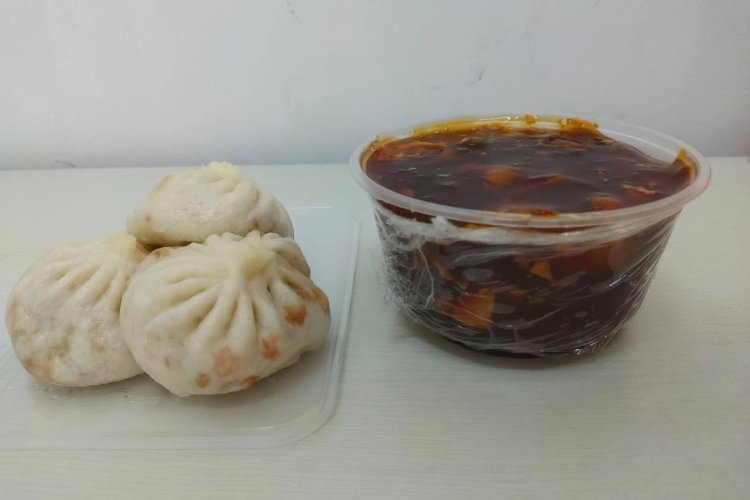Global Times Takes Aim at Baozza and De Refter for "Ridiculing" Chinese Culture With Fusion Food
The topic may be steamed buns, but the result is straight-up beef, the sort normally reserved for hip-hop feuds or rivaling political parties.
This foodie-centric point of contention kicked off earlier this week when state media organ the Global Times posted a video about Western spins on time-honored Chinese comfort food. Specifically, the video zeroes in on Beijing-based, Western brands Baozza and De Refter, which have snagged plenty of attention with their respective Baozza (a fusion of pizza and Chinese baozi) and BB Bao burgers (essentially gua bao which have been stuffed with more Western fillings like hamburger meat).
The Global Times video starts off innocuously enough, appearing to simply introduce these Chinese snacks with Western characteristics. However, the clip turns of the defensive before long, lambasting the creators of these fusion eats for "ridiculing" both cultures gastronomic traditions "for the sake of a marketing gag for expats with little or no culinary background" before, most damning of all, saying that such trendy items are usually "gone faster than you can flush the remnants of your latest food poisoning down the toilet." It stops short of naming both brands openly, though anyone who has sampled either De Refter or Baozza's products will quickly recognize their menu items in the footage.
Some have suggested that the short video is in fact satire, though watching it you'd be hard-pressed to decipher which elements are proffered tongue-in-cheek. Given that the Global Times has rarely been lauded for its razor-sharp wit, and with no reply to the Beijinger's requests for comment, the discussion surrounding the clip continues to roll on unabated.

De Refter head chef Clement Rol tells the Beijinger that he is "a bit disappointed by this video, because it's missing the point of our concept." He goes on to insist that he and his team are not looking to "steal something from the Chinese/Asian culture, we are trying to embrace it, by taking what's common and good, twisting it with my own background, as I've always loved to play around with food." He adds that he would've appreciated an opportunity to explain his position to the Global Times in an interview "as I love to debate, I'm very much passionate by what I do. But I also know that some people are more purists, and might not like what we do and that's ok, I also receive criticism very well because I'm always looking to improve and learn every day."
"When you are trying to be creative or different, you always hear bad things, but again, that's ok, you can't please everybody," Rol adds. "And I'm very open-minded, I've been criticised when I was at Park Square because I was doing fine dining fusion, but I never gave up because it's my food, my style, and even more, my soul."

Loren Heinold, co-founder of Baozza, was also surprisingly diplomatic (given the harsh language of the video), saying he sees Baozza as an "homage" above all to both the Chinese and Italian cuisines that he and his team have long loved. He adds that the clip "doesn't really capture any of the nuances, or just diversity, of baozi and pizza," before pointing to the baked baozi of Xinjiang, xiaolongbao, and a myriad of other regional takes on the street snack. On the other hand, he adds that Chicago deep dish, bready Detroit style square slices, and numerous other variations of pizza are all quite far removed from the thin crust Italian pies solely cited in the video.
"You might get some Italian pizza purists, saying Italian thin crust is the only kind of pizza, but there's also a ton of pizza innovation here in China with tons of different toppings," Heinold says. Indeed from Xinjiang lamb to durian toppings, there was no shortage of such East-meets-West combinations of pies during the Beijinger's Pizza Cup last fall. Heinold says: "We see ourselves as doing something creative in the same vein, and I would like to point out the vast majority of our customers – more than 90 percent – are Chinese."
Among those Chinese patrons is Clemence Jiang, a food blogger who has previously covered Beijing's dining scene in both expat and state media. While she's not a Baozza regular and admits the doughy, cheesy snack "may not be for everyone," she adds: "but I don’t understand why this person has made a video about her very personal opinion. I have tried Baozza a couple of times with my husband and we both loved it. It’s fun, easy to share, and perfect for grabbing a bite. I think Baozza is a smart idea."

A similar sentiment was voiced by Jim Boyce, one of Beijing's most seasoned bar and restaurant writers, who poked fun at the Global Times vid on his blog while also astutely pointing out that "fusion was the opening philosophy for Pizza Hut entering China," while also citing Dunkin’ Donuts pork floss and seaweed-topped donut as another major mainstream example that the Global Times omitted from its clip – a curious oversight if cultural appropriation was their gripe.

A lively debate about the Global Times clip erupted on social media shortly after it was posted, and the drama rose to the upper echelon of China watchers. For instance, Megha Rajagopalan, China bureau chief and Asia correspondent at Buzzfeed, re-Tweeted the clip and added: "Thank you Global Times for telling it like it is." This prompted a gloriously impassioned thread of replies, mostly from other detractors (and a few zingers from none other than Boyce). Further down Rajagopalan added: "the most pleasurable thing about a pizza is the crust. the most pleasurable thing about a baozi is the contrast between the soft slightly sweet exterior and the savory filling. and the fact that you can eat it at 6am. Why would you ruin both in this manner?" One of the sole voices of descent: Washington Post correspondent Emily Rauhala, who cheekily Tweeted: "Shameful confession: I don’t hate Baozza. Granted, I have little to no culinary background."
Rajagopalan went on to tell the Beijinger: "I didn't mean to throw shade ... I was just joking around. They're just not to my taste. I know lots of people who like them, which is probably why they've been around for a few years while other Beijing food fads have faded."
Decide for yourself if the Global Times' critique of these foods holds any weight by watching the video for yourself here. And if all this has left you hankering for a fusion feast, check out the participants from our Pizza Spinoff competition last year. We say: Screw the rules and let the creativity continue.
More stories by this author here.
Email: kylemullin@truerun.com
Twitter: @MulKyle
Instagram: mullin.kyle
Photos: The Global Times via Beijing Boyce, Baozza, Tracy Wang
Related stories :
Comments
New comments are displayed first.Comments
![]() wjh
Submitted by Guest on Sun, 06/24/2018 - 13:14 Permalink
wjh
Submitted by Guest on Sun, 06/24/2018 - 13:14 Permalink
Re: Global Times Takes Aim at Baozza and De Refter for ...
Who cares what Lilian [sic] Hamilton thinks, she works for that bastion of mediocrity The Global Times which is, frankly, an affront to globes and times.
She appears to suffer from regular food poisoning.
And her parents can't spell.
Validate your mobile phone number to post comments.







